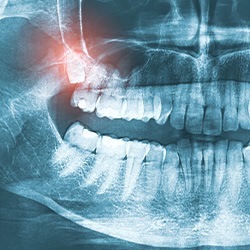Wisdom Tooth Extractions – Jupiter, FL
Be Proactive with Problematic Tooth Removal
Like other unnecessary things in life, wisdom teeth can be tolerated until they begin to cause trouble for your oral health. Normally, these teeth may erupt when a person is 17-25 years old. For some people, they never cause any trouble or even appear. But it is important to understand what they are and the problems they can cause in case the time comes to be proactive with problematic tooth removal. Also, if you decide to act, what do the procedure and ensuing recovery entail? To find out, continue reading or contact our friendly team.
Why Choose Jupiter Implant And Cosmetic Dentistry For Wisdom Tooth Extractions?
- Same-Day Emergency Appointments
- IV Sedation An Option For Your Comfort
- Numerous Payment Options Are Available
What Are Wisdom Teeth?

Wisdom teeth are the third set of molars at the very back of the mouth. Most people have four of them – one in each quadrant of their mouth. However, some people have only one or two.
They tend to develop long after the other adult teeth have already grown in when a person is older and “wiser” than they were years ago. Most scientists agree these teeth are largely unnecessary for modern humans, but they were essential for our ancestors who ate a very rough diet.
Why Do Wisdom Teeth Need to Be Removed?

Wisdom tooth removal is not always necessary, but that changes when these teeth pose a threat to a patient’s oral health. If your wisdom teeth are currently causing any of the following problems, or it is deemed likely they will do so in the future, your dentist in Jupiter will recommend you get them extracted:
- Overcrowding: The wisdom teeth can push against your other teeth causing overcrowding and misalignment.
- Infection: The wisdom teeth can be difficult to clean which means they could accumulate food particles and bacteria to easily become infected.
- Cysts and tumors: Cysts can form when fluid builds up around a tooth. This can damage the jawbone and shift the tooth out of place.
If you ever experience any discomfort around your wisdom teeth, you may require emergency treatment, so do not hesitate to call us for a same-day appointment.
What to Expect from the Wisdom Teeth Extraction Procedure

If your wisdom teeth have fully erupted, we may utilize basic extraction techniques to remove them. That means we will use dental forceps and an elevator to gently extract them. However, if the teeth are fully or partially impacted (stuck beneath the gumline), surgical techniques might be required to get them out.
For example, we may have to create incisions in the gums to access the tooth before carefully breaking it into smaller pieces. Regardless of the technique chosen, it’s always a priority to keep you comfortable during the procedure.
Recovering from Wisdom Teeth Extraction

Most people feel better within a week or so of their wisdom tooth extraction in Jupiter. In the meantime, swelling and facial soreness are normal. Some bleeding may also occur. You must be careful not to disturb the blood clots in your extraction sites.
You should eat soft foods, avoid drinking through straws, avoid smoking, and be very careful when performing oral hygiene tasks. If you have any questions or concerns during your recovery, we’ll be ready to help.
Understanding the Cost of Wisdom Tooth Extractions

While you may need a wisdom tooth removal, you’ll need to know its cost before you commit. That’s only natural – you can’t tell if treatment fits your budget otherwise. Still, there isn’t a set price you can look up; the cost of wisdom tooth extractions varies by patient. If you want a precise estimate, you should consult Dr. Shane, Dr. Amiee, and the rest of our team. We’ll then work to make your extraction affordable, walking you through pricing factors, dental insurance, and more.
Factors That Can Impact the Cost of Wisdom Tooth Extractions

Our team will perform a thorough oral exam when you see us for your consultation. This step lets us check the factors that affect your extraction’s cost, such as:
- Number of Wisdom Teeth – As you’d expect, the number of removed wisdom teeth impacts treatment costs. The more that need an extraction, the higher the price of care.
-
Impaction – It costs more to remove impacted wisdom teeth. Plus, the type of impaction affects how much the price rises.
- With a soft tissue impaction, the treatment cost doesn’t rise that much. It’s still pretty easy to remove a wisdom tooth that’s partly emerged from the gums.
- On the other hand, a bony impaction can often prove pricey. Treating it means removing a tooth lodged in the jawbone.
- Need for Sedation – Based on whether you need surgical or simple extraction, you could require sedation as part of treatment. The use of dental sedatives would incur an extra cost.
- Specialist Type – If you require a complex wisdom tooth extraction, you’ll likely need an oral surgeon. Having someone like that handle your care will increase your expenses.
Does Dental Insurance Cover Wisdom Tooth Extractions?

Dental insurance doesn’t always cover wisdom tooth removal, but most plans offer at least some benefits. Whether you’ve met your yearly deductible and maximum will affect the final coverage. At the same time, you can see an in-network dentist to reduce out-of-pocket costs.
To get the most out of your insurance, remember to call your provider and check your benefits before treatment. Our team will gladly assist with that process if you want.
How to Make Wisdom Tooth Extractions Affordable

Even without insurance, you can still make a wisdom tooth extraction affordable. Just rely on our practice’s payment options to manage the final cost! After all, Jupiter Implant and Cosmetic Dentistry offers services like:
- In-House Savings Plans – For a moderate annual fee, we’ll give you (among other things) a free emergency oral exam and a 15% discount on wisdom tooth extractions.
- Dental Financing – Our team takes pride in working with CareCredit, a reputable 3rd party financier. They’ll let you pay for your extraction in monthly installments with little or no interest.
Getting rid of your wisdom tooth (or teeth) shouldn’t have to “break the bank.” With that said, visit our office soon – we’ll help you finance your treatment!
Wisdom Tooth Extractions FAQs
Why Are “Wisdom” Teeth Called Such?
You may wonder why “wisdom” teeth are called such. After all, extra chompers growing at odd angles don’t seem very “wise” per se. Well, the origins of their name are simpler than you’d think.
You see, wisdom teeth don’t emerge until early adulthood – ages from 17 to 25 years old. People, then, get them later than the rest of their pearly whites. They’re thus “adult-only” teeth that become part of your smile at the age of wisdom. Given these facts, the world took to calling them wisdom teeth.
Is Wisdom Tooth Removal Painful?
Rest assured; wisdom tooth removal isn’t painful. Dentists take every precaution to ensure the process is smooth and comfortable.
In reality, you’ll be given anesthetic and sedatives before treatment. The former will numb your mouth, while the latter will dull your body’s ability to register pain. Consequently, you can expect the procedure to be entirely painless. The most you might feel is a slight pressure as the dentist works.
Granted, you’ll likely feel some soreness and discomfort after the surgery. These aches are easily manageable, though, with the proper aftercare. Plus, they’ll quickly fade within a week.
Do Wisdom Teeth Stitches Dissolve?
Indeed, pulling wisdom teeth involves stitching the tissue where incisions were made. Fortunately, however, these strings aren’t a long-term issue.
Usually, these stitches dissolve fully after a few weeks or a month. The timing will vary based on certain factors, including your extraction’s severity, type, material, and stitch size. Whatever the time length, though, the dissolution means stitching won’t cause any issues.
Of course, your dentist or surgeon may not place dissolving stitches. In that case, they’ll have you return for a follow-up visit to have the material removed. This appointment is typically seven to ten days after the original procedure.
What Can I Eat After Wisdom Tooth Surgery?
Following wisdom tooth surgery, you’ll face some temporary food restrictions. You really should follow them, as maintaining the right post-treatment diet allows for a seamless recovery.
Firstly, be mindful of what you eat or drink soon after the procedure. Your mouth will still be numb for a while, so you don’t want to burn or damage it while you can’t feel anything. Try, then, to avoid hot foods and beverages, as well as crunchy or spicy things that could irritate your oral tissues.
Secondly, follow a soft food diet for the next few days as your mouth heals. Items like yogurt, applesauce, cottage cheese, and smoothies would be ideal meal choices. Hydrate with plenty of water, too, though don’t use a straw – the sucking motion can lead to a dry socket.
